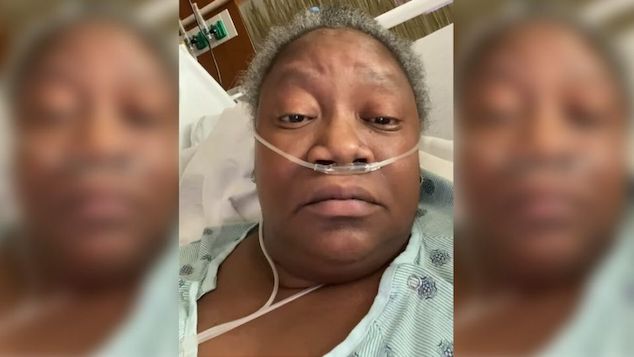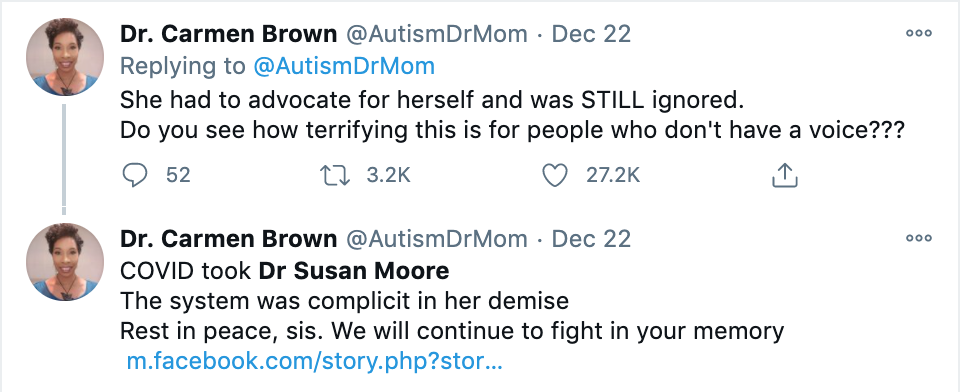
Dr. Susan Moore black Indiana doctor dies of COVID-19 following video in which she complaints that she was mistreated because of her race.
A black Indiana doctor has died in hospital just two weeks after posting video claiming that she was being mistreated & delayed proper care because of her race while suffering from the coronavirus.
Dr. Susan Moore, 52, of Indianapolis died on Sunday, December 20, due to complications from COVID-19.
She was first diagnosed with COVID-19 on November 29. Since then, she had been admitted to the Indiana University North Hospital.
But Moore’s stay at IU Heath led to her complaining of her ‘ordeal’ at the facility.
While struggling to breathe & speak, Moore posted a 7.5 minute video on Facebook on December 4 in which she claimed having to beg for a CT scan and remdesivir, an antiviral drug that can speed up recovery from the virus.
Dr. Susan Moore received racist mistreatment by Indiana University Health before losing her life to COVID19. Sadly, her fate is familiar to Black patients who often get inferior treatment. IU Health must be held accountable for discriminatory malpractice! https://t.co/z4udhtMOD2 pic.twitter.com/emalns36g3
— Ben Crump (@AttorneyCrump) December 24, 2020
Inadequate care or treatment cause of race
In her video, Moore said despite her complaints to medical staff that she was in pain, doctors wanted to discharge her from the hospital.
She also claimed doctors were dismissive of her complaints after saying she was experiencing difficulty breathing.
It was only after scans and tests proved her right that the doctors believed her.
Moore complained of being given inadequate medical care due to her race.
‘This is the second worst day here at IU North,’ Moore says in the video.
‘Yesterday, Dr. [Eric] Bannec wanted to send me home.
‘At that time I had only received two treatments of the remdesivir. He says: “Ah, you don’t need it. You’re not even short of breath”.’
‘You don’t qualify!’
Moore continued: ‘I said, “Yes, I am”.’
‘Then he went on to say: “You don’t qualify.”
‘I must’ve because I’ve gotten two treatments,’ Moore said.
‘Then, he further stated: “You should just go home right now. And I don’t feel comfortable giving you anymore narcotics.”
‘I was in so much pain from my neck,’ she said. ‘My neck hurt so bad.’
When a white physician by the name of Bannec told her he would not give her pain medication, Moore said: ‘I was crushed.’
‘Left wanting’
‘He made me feel like I was a drug addict,’ she said. ‘And he knew I was a physician.’
Moore added: ‘I don’t take narcotics. I was hurt.’
She said she was ‘left wanting’ after speaking to a patient advocate who told her: ‘There’s not much I can do.’
Moore said she then asked to be sent to another hospital ‘if they’re not going to treat me properly.’
She said that she was then administered a CT scan of her neck and lungs which showed inflammation in those areas, confirming her earlier complaints of pain and discomfort.
Those scans finally convinced the doctors to give her pain medication.
‘You have to show proof that you have something wrong with you in order for you to get the medicine,’ Moore said.
‘I put forth and I maintain if I was white, I wouldn’t have to go through that.’
Moore added: ‘That man (Bannec) never came back and apologized.’

‘This is how black people get killed’
She then said that it took staff more than four hours to administer pain medication treatment.
‘I have been in pain since 7am, you know,’ Moore told the nurse.
‘I can’t be here every five minutes,’ the nurse is reported to have responded to Moore.
‘No, you were here once in four hours,’ Moore said.
‘That is not how you treat patients,’ she said. ‘Period.’
‘I don’t trust this hospital and I’m asking to be transferred.’
Moore also said that Bannec told her that if she stayed in the hospital she would eventually be discharged at 10pm the next Saturday.
‘Who does that?’ Moore said of being sent home from the hospital late at night.
‘This is how black people get killed, when you send them home and they don’t know how to fight for themselves,’ she said.
‘Diversity training’
‘I had to talk to somebody, maybe the media, somebody, to let people know how I’m being treated up in this place.’
Moore said that the physician who treated her knew that she was a doctor.
‘[Bannec] didn’t want the black doctor to have no medicine,’ she said. ‘Nothing.’
Moore then said that the nurse bragged that it was ‘because of him’ that she was getting pain medication.
She later posted an update on Facebook saying that she had spoken to the IU healthcare system’s chief medical officer and that her pain was being ‘properly managed.’
Moore said the CMO ‘stated that there will be some diversity training’ and that they were ‘working on’ getting an apology from Bannec.
After she was sent home by IU North, she was back in a different hospital – Ascension-St. Vincent in Carmel, Indiana – within 12 hours on December 7.
Moore said she experienced a spike in temperature and a drop in her blood pressure.
‘Spiked a temperature of 103 and my blood pressure plummeted to 80/60 with a heart rate of 132,’ she wrote in an update on Facebook.
‘Those people were trying to kill me,’ Moore said of the medical staff at IU North.
‘Clearly everyone has to agree they (discharged) me way too soon.’
She gave a much better assessment of her care at Ascencion-St. Vincent.
Did lackluster care lead to Dr Moore’s death?
‘They are now treating me for a bacterial pneumonia as well as Covid pneumonia,’ she said.
‘I am getting very compassionate care. They are offering me pain medicine.’
On December 10, Moore’s condition deteriorated to the point where she had to be intubated. She died on Sunday, two days after she was placed on a ventilator.
Moore’s 19-year-old son, Henry Muhammed, confirmed his mother’s death to The New York Times.
He said that by the time his mother was placed on a ventilator, she was coughing so much that she could barely speak.
Doctors who followed Moore’s case from afar cannot definitively say that the claims of inadequate treatment at IU North directly led to her death.

Social media responds
Still, observers said her experience at the hospital is an all-too common occurrence for African American patients, many of whom do not get adequate care.
Muhammed also told the Times that his mother suffered from an underlying condition – sarcoidosis.
He said his mother was frequently admitted to the hospital to be treated for the condition, which is an inflammatory disease that attacks the lungs.
Muhammed said that his mother routinely needed to struggle to get adequate care whenever she was ill.
‘Nearly every time she went to the hospital she had to advocate for herself, fight for something in some way, shape or form, just to get baseline, proper care,’ he said.
In the United States, black people and Latinos are almost three times more likely to die from COVID-19 then whites, according to the Centers for Disease Prevention (CDC), which cited economic disparities.
Come Thursday, IU Health President and CEO Dennis Murphy addressing Dr Moore’s case issued a statement in which he said, ‘I am concerned, however, that we may not have shown the level of compassion and respect we strive for in understanding what matters most to patients,” he said. “I am worried that our care team did not have the time due to the burden of this pandemic to hear and understand patient concerns and questions.’
A GoFundMe crowdfunding effort started for Moore’s family as of Friday night had raised more than $146,400.






